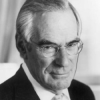David Halberstam

David Halberstam
David Halberstamwas an American journalist and historian, known for his work on the Vietnam War, politics, history, the Civil Rights Movement, business, media, American culture, and later, sports journalism. He won a Pulitzer Prize for International Reporting in 1964. In 2007, while doing research for a book, Halberstam was killed in a car crash...
NationalityAmerican
ProfessionJournalist
Date of Birth10 April 1934
CityNew York City, NY
CountryUnited States of America
When Murrow goes after him, he's finished. That's when you know he's losing the public,
QUESTION: Do you know what the greatest test is? ANSWER:Do you still get excited about what you do when you get up in the morning?
Fear was the terrible secret of the battlefield and could afflict the brave as well as the timid. Worse it was contagious, and could destroy a unit before a battle even began. Because of that, commanders were first and foremost in the fear suppression business.
If there is anything that is important to America, it is that you are not a prisoner of the past.
What looked safe was not safe. What looked hard and unsafe was probably safer. Anyway, safe was somewhere else in the world.
The byline is a replacement for many other things, not the least of them money. If someone ever does a great psychological profile of journalism as a profession, what will be apparent will be the need for gratification—if not instant, then certainly relatively immediate. Reporters take sustenance from their bylines; they are a reflection of who you are, what you do, and why, to an uncommon degree, you exist. ... A journalist always wonders: If my byline disappears, have I disappeared as well?
Nixon, who spent much of his career attacking the press and saying he was a victim of the press, was in fact created by the press, in this case the L.A. Times.
With the marketing pressures driving the book world today, it's much easier to get the author of a memoir on a television show than a serious novelist.
There are only two kinds of stories in the world: those about which I do not care to write as many as 600 words, and those about which I would like to write many more than 600 words. But there is nothing about which I would like to write exactly 600 words.
Few sports has as great a disparity between the time committed in practice and time actually spent in game or race conditions.
During their college years the oarsmen put in terrbily long hours, often showing up at the boathouse at 6:00am for preclass practices. Both physically and psychologically, they were separated from their classmates. Events that seemed earth-shattering to them-- for example, who was demoted from the varsity to the junior varsity -- went almost unnoticed by the rest of the students. In many ways they were like combat veterans coming back from a small, bitter and distant war, able to talk only to other veterans.
Bart Giamatti did not grow up (as he had dreamed) to play second base for the Red Sox. He became a professor at Yale, and then, in time president of the National Baseball League. He never lost his love for the Boston Red Sox. It was as a Red Sox fan, he later realized that human beings are fallen, and that life is filled with disappointment. The path to comprehending Calvinism in modern America, he decided, begins at Fenway Park.
Always stay in with the outs.
Physically, rowing was remarkable resistant to the camera... the camera liked power exhibited more openly, and the power of the oarsmen [is] exhibited in far too controlled a setting. Besides, the camera liked to focus on individuals, and except for the single scull, crew was sport without faces.